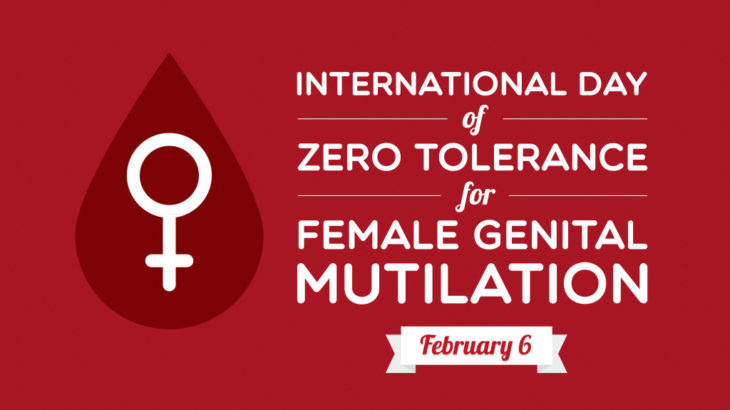2024 International Day of Zero Tolerance for Female Genital Mutilation (FGM).
Her Voice Her Future is this year’s theme for International Day of Zero Tolerance for Female Genital Mutilation (FGM), marked annually on February 6. According to multiple international human rights conventions, FGM is a violation of girls’ and women’s human rights and UN and thousands of global actors are trying to eliminate the practice by 2030 in the spirit of SDG #5: gender equality.
By Heidi Basch-Harod and Erin Pedersen

What is Female Genital Mutilation/Cutting (FGM/C)?
FGM/C is an internationally-recognized human rights violation that involves the complete or partial removal of female genitalia for non-medical reasons. Most commonly performed on girls between infancy and puberty, it can result in long-term side effects including extreme pain, excessive bleeding, urinary tract and menstrual problems, pain during sex, complications during childbirth and psychological impacts.
Source: Hartford Courant
Where Does FGM/C Occur?
Occurring in 92 countries, at least 200 million girls have been cut worldwide, but exact numbers are impossible to know. FGM practice is highly concentrated in African countries, in areas of the Middle East, and in some countries in Asia. In the last three decades there has been a decline in the prevalence of the practice but it is far from eliminated. Pockets of Europe, Australia, North & South America also see cases of FGM/C as these are destinations for migrants from countries where the practice occurs regularly.
Source: Hartford Courant & UNICEF


A Look at FGM/C in The United States.
As many as 513,000 women and girls across the USA are at risk or have already undergone FGM/C, even though it has been classified as a federal crime since 1996. Underground, community “whisper networks” connect practitioners and interested parents. The practice also occurs in U.S. healthcare settings.
Source: Congress.gov, Equality Now, Hartford Courant
Making Her Voice Heard: Siminesh Cimollo Works Toward Justice.</span
Siminesh Cimollo was cut at the age of 9 in Ethiopia. She now lives in Connecticut, which is 1 of 9 U.S. states that do not have a law addressing the practice. Today she is part of a survivor-led coalition of more than 30 member organizations fighting for the criminalization of FGM/C in Connecticut to hold accountable parents and practitioners, who enable the procedure.
Source: Hartford Courant


Women in The Gambia: For and Against FGM.
Across the Atlantic Ocean, at the start of 2024, Gambian women were convicted of performing FGM on several children, even though the practice has been banned since 2015. An Islamic cleric paid the fines issued to the women for violating the law, the Gambia Supreme Islamic Council issued a fatwa declaring FGM “one of the virtues of Islam”, and some members of the country’s National Assembly called for a lifting of the ban.
Source: Ibanet
The Tension Between Religion, Culture, and Human Rights.
The ban on FGM in The Gambia took effect under the Maputo Protocol, an international human rights instrument adopted by the African Union, based on the Convention on the Elimination of All Forms of Discrimination against Women. The Protocol includes language around culture and religion not being used as a smokescreen for women’s rights abuses.
Source: Ibanet


The Power of Voice and Persistence: The Work Ahead.
It took over 20 years to get communities in The Gambia to commit to an agreement to stop the practice. Community engagement with rulers, traditional leaders, and shared testimonies of children who survived FGM/C and its negative effect on their health, eventually led to consensus that it needed to end. Still, in 2023, UNFPA Representative in The Gambia, Ndeye Rose Starr, stated that on average every other young girl in the country has undergone FGM/C.
Source: Ibanet
The Long Road Ahead.
In order to eliminate FGM by 2030, efforts to do so will need to increase tenfold. While this may seem daunting, women themselves give the mandate for this to be so. Representative data compiled by UNICEF on attitudes toward FGM, shows that a majority (23 out of 30) of girls and women think the practice should end. Help us raise their voices by sharing this post.
Source: United Nations, UNICEF


“You can’t create change if you’re not allowed to talk about something.”
– Mariya Taher, FGM/C survivor and co-founder of Sahiyo
Questions to Our Readers
What steps can individuals and communities take to contribute towards the elimination of Female Genital Mutilation by 2030, considering the cultural, religious, and legal challenges ? #EndFGM #HerVoiceHerFuture?
Stay Informed with our Newsletter.
Receive exclusive invitations to our programs; free films to watch from free film collection Voices For Change; news about gender equality around the world; and access to our partners’ programs.





